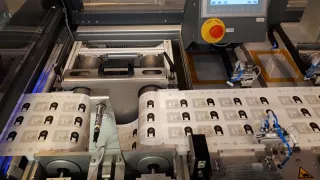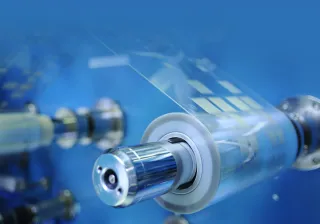The SUPERSMART project team was selected as the best publicly funded demonstrator in the OE-A 2021 competition. One of the two multi-layer demonstrators, an anti-counterfeit label with 11 printed layers, was manufactured at the pilot facility of VTT, one of the eleven partners of the SUPERSMART project.
The SUPERSMART research project is a European consortium developing printed electronics onto paper using highly scalable technological processes that also allow mass production.
In the OE-A 2021 competition, SUPERSMART resulted in two paper-based demonstrators: a shock detection active tag to track product damage during transport and an anti-counterfeiting label to authenticate medical or luxury products.
Printed and hybrid electronics are one of the key research areas at VTT.
"VTT has the unique position being able to combine in-house developed sustainable bio-based materials with printed and hybrid electronics as well as upscaling the infrastructure for manufacturing of different solutions," says Maria Smolander, Research Team Leader, Flexible sensors and devices at VTT.
Sustainability arrives in electronics
Sustainability is coming to all businesses, also to electronics.
“The driving force is that lots of electronic waste is already generated, and the amount is increasing rapidly. At the same time, we are getting shortage of some materials. So all materials used in electronics have to be more sustainable," says Smolander.
At the same time, businesses want to add electronics to various products and packages. For example, miniaturised and inexpensive electronic labels can monitor transport and logistics or provide forgery-proof information about the origin and authenticity of products.
"Everyone wants to make their products smart, but nobody thinks what environmental impact you have when you stick sensors on everything. Sensors and microchips have a limited lifetime. We have to create strategies for used electronics. Can we disassemble or re-use them, maybe even compost them? We have to think about the whole lifecycle of electronics," says Ralph Liedert, Customer Account Lead at VTT.
Paper has an essential role
“The SUPERSMART research project has proven that printed electronic components such as sensors and smart labels on paper can play an essential role in setting up an intelligent production, retail, and logistics environment,” says Liisa Hakola, Senior Scientist and Project Manager at VTT.
Efficient and reliable production processes make them economically competitive. And in terms of resource conservation, climate, and the environment, electronics printed on paper have outstanding advantages over conventional substrates and manufacturing processes for smart electronic components.
The yearly OE-A Competition supports companies and designers s to develop a vision of future applications in flexible, organic, and printed electronics. Organic and Printed Electronics Association organises the competition.


